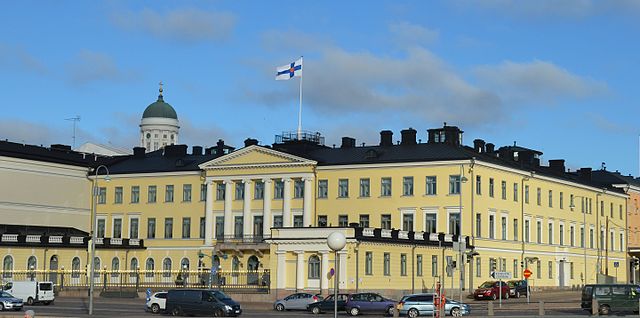
HELSINKI — Donald Trump and Vladimir Putin will meet Monday at Finnish presidential palace in Helsinki that overlooks the Baltic Sea — the same venue where two of their predecessors met in 1990.
Finnish President Sauli Niinisto’s office said the American and Russian leaders will hold their summit at the 19th-century Presidential Palace, located a stone’s throw away from the capital’s iconic waterfront Market Square.
Putin and Trump have met twice before on the sidelines of international meetings but the Helsinki summit will be their first official stand-alone meeting.
U.S. President George H.W. Bush and Soviet President Mikhail Gorbachev held talks at the same venue in 1990.
To kick off the day, Trump and his wife, Melania, will join Niinisto and his wife, Jenni Haukio, for breakfast at Mantyniemi, another presidential residence in Helsinki where the couple lives most of the time. Niinisto also will hold a bilateral meeting with Putin.
Finland, a Nordic nation of 5.5 million, has a long legacy of hosting U.S.-Soviet and U.S. Russian summits due to its geographic location and perceived neutrality.
The last time a summit brought presidential entourages from Moscow and Washington to Helsinki was in March 1997, when U.S. President Bill Clinton and Russian President Boris Yeltsin held talks on arms control and NATO expansion.
In June, U.S. Marine Corps Gen. Joseph Dunford, chairman of the Joint Chiefs of Staff, met with Gen. Valery Gerasimov, the chief of the Russian military’s General Staff, in a manor house owned by the Finnish state to exchange views on U.S.-Russia military relations, Syria and international security.
Along with the presidents, U.S. Secretary of State Mike Pompeo and Russian Foreign Minister Sergey Lavrov will meet at the Presidential Palace on Monday.
Sari Autio-Sarasmo of the University of Helsinki’s Aleksanteri Institute said the Finnish capital and Vienna, the capital of Austria, were important conduits between the East and the West during the Cold War.
While both European cities were centres of espionage, Helsinki specialized in relaying information and acting as a go-between for world’s two superpowers.
“As a member of the European Union, Finland doesn’t anymore emphasize its neutrality, but strong expertise, particularly on Russia, and good location make Finland a very useful meeting place,” said Autio-Sarasmo, who studies Cold War history.
U.S. President Gerald Ford and Soviet leader Leonid Brezhnev met in Helsinki in 1975 to sign the landmark Helsinki Accords, a watershed commitment to peace, security and human rights.
Finland joined the European Union in 1995, but has remained outside of NATO as a militarily non-aligned nation in a similar way as close Nordic neighbour Sweden.
The 3,000-square-meter (32,292-square-foot) Presidential Palace, which underwent a major renovation completed in 2015, has hosted other prominent guests, including Britain’s Queen Elizabeth II and the late (now a saint) Pope John Paul II.
It was built for a wealthy Finnish merchant in the early 19th century on the grounds of a former salt store house.
Finland was integrated into Russia’s Czarist Empire as an independent Grand Duchy in 1809 after being part of the Kingdom of Sweden for nearly 700 years. The building was completed in 1845 at the request of Emperor Nicholas I and became the Imperial Palace.
Key rooms were modeled after the Winter Palace in St. Petersburg, the official residence of Russian monarchs.
Russian Emperor Alexander II visited the palace several times. He was popular with Finns due to his policies sympathetic to Finland.
During World War I, the grand residence temporarily housed a military hospital. Following Finland’s independence from Russia in 1917, it was officially renamed the Presidential Palace in 1921.
The palace now is the working residence of Finland’s president. It currently houses his office and is the venue for official events.